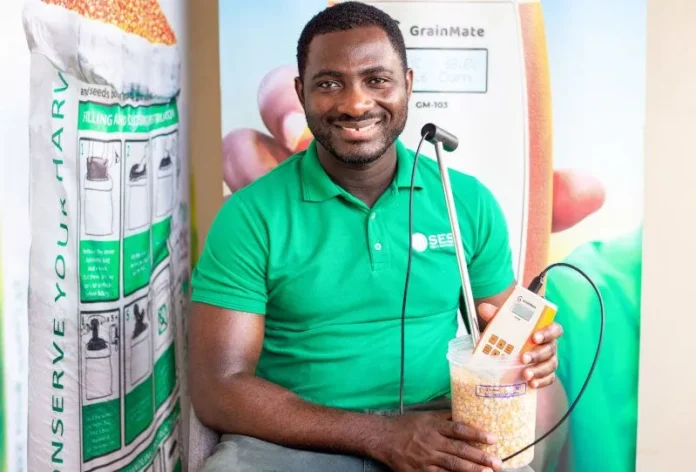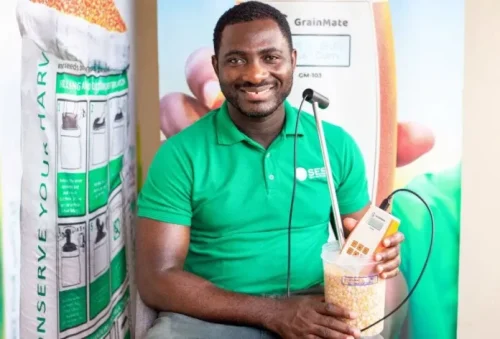Agribusiness: Sesi Technology develops ‘GrainMate’ to check moisture levels in grains to reduce post-harvest losses


Isaac Sesi holding the GrainMate moisture metre in Accra, Ghana. Photo by: Richard Akakpo
A wholly Ghanaian-owned tech firm, Sesi Technologies, has developed a moisture-testing device to aid stakeholders in the agribusiness sector of the economy in overcoming the perennial post-harvest losses of their farm produce.
With the GrainMate Moisture Metre, grain farmers, aggregators, commodity traders, feed producers, and warehouse operators can measure the moisture content of their grains with ease.
GrainMate can measure the moisture content of up to seven different commodities, including corn, rice, soybeans, sorghum, millet, groundnut, and wheat.
“Moisture content is one of the physical quantities that are essential in determining the quality of your end product, so we have come up with the GrainMate to make it easy to know how much moisture content you have in your product,” Sesi, founder of Sesi Technologies, explains.
Isaac Sesi learned about the difficulties of grain storage in the Ashanti region. He observed the problems farmers faced in attempting to preserve their agricultural products. Sesi, therefore, devoted his academic career to finding a lasting solution to the menace.
In 2018, he completed the first version of GrainMate. It was intended to make it simple for farmers, aggregators, feed manufacturers, and everyone else involved in the grain value chain to determine the moisture content of their grain before storage, feed preparation, or processing.
“One aspect of food security is in the process of being able to reduce or mitigate post-harvest losses because 30% of the food that we produce is lost… If we can cut down on these losses, that will bode well for our food security because the food that is being lost is food that can feed other people,” said Sesi.
Sesi graduated from the Kwame Nkrumah University of Science and Technology (KNUST). ‘GrainMate’ emanated from his research thesis.
“In Ghana, with research, you just finish and put it on the shelf, so you move on with your life but we thought that we developed something pretty good so we wanted to make it beneficial to farmers so I started Sesi Technologies to commercialise the output of my research at KNUST,” he stated.
The major success of Sesi Technologies occurred after the sale of about 150 GrainMate devices. “Sesi Technologies was initially financed through a large pre-order by an international non-profit. This gave us the funds we needed to produce our first 150 units and hire our first employee,” the entrepreneur reportedly noted.
“We started with no money—absolutely no money. We just started by trying to commercialise this technology. We were able to manufacture our first batch because we got some pre-orders, so we asked the client to pay 70% so that we could use it to finance the initial inventory,” he revealed.
Meanwhile, the GrainMate moisture testing device appears less expensive than similar imported devices.
Sesi’s company offers two models. One is for regular grains, sold at 800 Ghanaian cedis (about US$65), while a second model extends to high-value commodities such as shea nuts. That version costs 1,000 Ghanaian cedis (about US$83).
GrainMate moisture testing device adoption
Over 5,000 farmers have now tried out the device, although uptake has been slower than Sesi and his young team anticipated. “There’s very slow adoption of new technology, and so we have not seen the kind of rapid adoption that we are looking at,” he stated.
Sesi Technologies has an employee strength of about 25 people. The company also has field personnel who render Sesi’s services to farmers.
Sesi has high hopes for the future and is looking to expand by hiring experienced engineers to staff a local manufacturing facility to boost output and promote the GrainMate device’s growing popularity.





